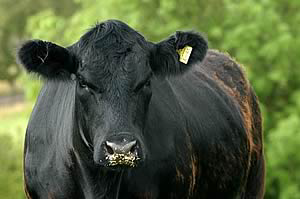Fibrolytic enzymes benefit beef cattle

A group of scientists from the UK, Canada and China studied the use of a fibrolytic enzyme in barley-based diets for beef cattle.
The study, published in the Journal of Animal Science, consisted of two experiments to evaluate the effects of adding an exogenous fibrolytic enzyme (FE) on ruminal pH and fermentation, digestibility, and growth performance of feedlot beef cattle fed a finishing diet containing wheat dried distillers grains with solubles (DDGS).
In Exp. 1, 4 ruminally cannulated Angus heifers (average BW of 807 ± 93.9 kg) were used in a replicated 4 × 4 Latin square design. Treatments were 1) control (CON; 10% barley silage and 90% barley grain–based concentrate), 2) CON diet substituting 30% wheat DDGS for barley grain (WDG), 3) WDG diet supplemented with low FE (WDGL), and 4) WDG diet supplemented with high FE (WDGH). Heifers fed WDG had less (P = 0.01) total tract DM digestibility than heifers fed CON.
Increasing FE linearly (P < 0.05) increased starch digestibility without affecting digestibility of other nutrients. Addition of FE also reduced (P = 0.03) ruminal ammonia-N (NH3–N) concentration but did not affect VFA concentration. Moreover, application of FE to wheat DDGS linearly increased in situ ruminal DM (P < 0.01) and NDF (P = 0.02) disappearance after 48 h of incubation.
In Exp. 2, 160 yearling steers (initial BW = 495 ± 37.9 kg) were fed the same diets as in Exp. 1. No differences in DMI, final BW, ADG, dietary NEg, or carcass characteristics were observed among diets. However, the steers fed WDG had less (P < 0.05) G:F and greater number of (P < 0.01) abscessed livers than steers fed CON.
Increasing FE application in wheat DDGS diets did not affect DMI, final BW, or ADG but tended (P < 0.09) to linearly improve feed efficiency and decreased (P = 0.03) the incidence of abscessed livers. These results demonstrated adverse effects of including wheat DDGS in finishing diets on feed digestion, feed efficiency, and animal health. Application of FE in wheat DDGS–based diets potentially improved starch digestion, protein metabolism in the rumen, feed efficiency, and animal health.
[Source: Journal of Animal Science]











